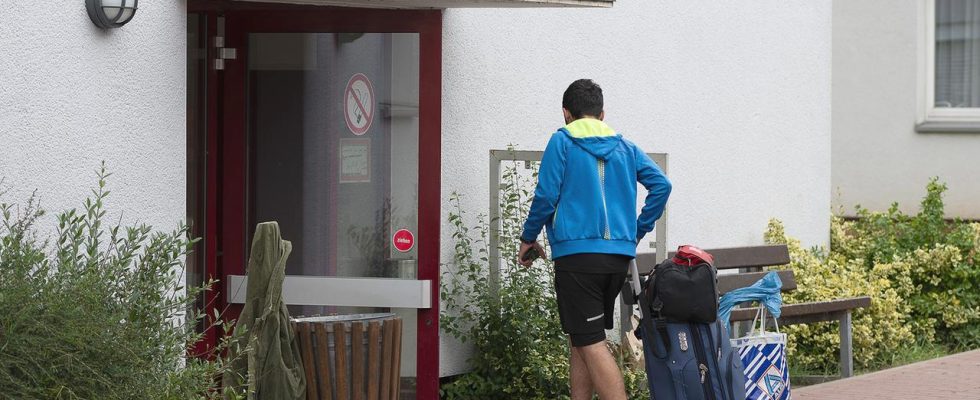The issue of migration is once again at the top of the agenda – the reason is the sharp increase in numbers. The Union is now calling on the Chancellor to initiate an “urgently needed asylum transition”. “We can’t do it anymore,” believes Union faction deputy Spahn.
Less illegal migration to Germany – that’s what the Union is demanding from the federal government. In a proposal from the CDU and CSU parliamentary groups, which will be discussed in the Bundestag today, she advocates a “Germany pact in migration policy”.
Federal Chancellor Olaf Scholz must now make “the urgently needed asylum transition” a top priority, demands the deputy chairwoman of the Union parliamentary group, Andrea Lindholz. “The Federal Minister of the Interior is clearly overwhelmed by this, the Foreign Minister is practically inactive,” said the CSU interior expert of the “Rheinische Post”, referring to Interior Minister Nancy Faeser (SPD) and Foreign Minister Annalena Baerbock (Greens).
What the Union demands
Anyone who has already applied for asylum in other member states or whose application for asylum has been rejected should “be able to be rejected at the internal borders if they continue their journey within the EU on their own initiative,” the Union demands in its application. In addition, the list of countries of origin that are safe under asylum law is to be expanded to include Georgia, Moldova, India as well as the Maghreb states of Tunisia, Morocco and Algeria in order to speed up asylum procedures.
According to the application, the federal government should also establish stationary border controls with additional flexible veil searches at the borders with Poland, the Czech Republic and Switzerland. In addition, incentives for secondary migration to Germany should be reduced. According to the application, this should be achieved “by bringing the social standards in the EU for asylum seekers and those entitled to protection closer together, taking into account the purchasing power of the member states.”
Spahn: “We can’t do it anymore”
Union parliamentary group vice-president Jens Spahn said ZDF, a joint decision is needed in the democratic center on the issue of migration in order to undermine populists from the left and right and radicals on the issue. “We need a common understanding,” said Spahn. “And I’m not sure whether that exists within the federal government,” he said.
“We are at the limit of what is possible. And these numbers have to go down significantly, very significantly in a very short time,” said Spahn, referring to the migration numbers. “We can’t do this anymore.”
Faeser sits down Migration agreement
Federal Interior Minister Nancy Faeser warned ZDF from believing that there are simple solutions. Irregular migration must be limited, she admitted. “We want to control this more strongly through migration agreements,” she said. These should enable people to come to Germany legally – and the contractually bound countries should then undertake to take people back, i.e. rejected asylum seekers.
Faeser reiterated the government’s refusal to accept refugees arriving in Italy in Germany. “Italy is not adhering to the Dublin readmission. And as long as Italy doesn’t do that, we won’t take in any more refugees,” said Faeser. A solidarity mechanism has been agreed upon in the European Union. Rome must now approach Germany again and fulfill its obligations.
Reforms planned
In terms of domestic policy, Faeser is apparently planning far-reaching reforms in migration and refugee policy, which could ensure more immigration to Germany. As “Welt am Sonntag” reports, she wants to make it easier for families to reunite. In addition, asylum seekers and tolerated persons should have easier access to the labor market. This emerges from a draft bill for a family and labor market integration law that is available to the newspaper.
The draft from September 4th is not yet in a departmental vote. It stipulates that in the future, family reunification for those entitled to subsidiary protection will be treated the same as that of recognized refugees. In addition, the current limit on the number of people to 1,000 per month will no longer apply. According to the report, there should also be significant easing of the entry of relatives for unaccompanied minor refugees.
Warning from Saxony-Anhalt about overloading
Saxony-Anhalt’s Prime Minister Reiner Haseloff (CDU) expects serious problems in Germany if the irregular entry of migrants continues to increase as before. “In the first eight months of this year alone, we had over 70,000 illegal entries into Germany. As of the end of last year, 300,000 people in Germany were also required to leave the country,” Haseloff told the “Mitteldeutsche Zeitung”. People who are really entitled to asylum and need help can no longer be helped effectively. In addition, municipalities and states would find themselves in a situation “that they can no longer cope with”.
Recently, the number of asylum seekers has risen sharply. In the first eight months of this year, 204,461 people applied for asylum in Germany. For comparison: In the entire year of 2022 there were only slightly more – namely 217,774 initial applications.

